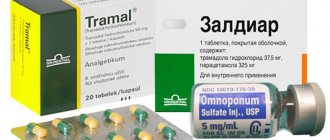Composition and release form
Monocinque®
| Pills | 1 table |
| isosorbide-5 mononitrate | 40 mg |
| excipients: lactose monohydrate; MCC; corn starch; talc; magnesium stearate |
15 pcs in blister; There are 2 blisters in a box.
Monocinque® retard
| Retard capsules | 1 caps. |
| isosorbide-5 mononitrate | 50 mg |
| excipients: sucrose; ethylcellulose; corn starch; talc; stearic acid |
15 pcs in blister; There are 2 blisters in a box.
Contraindications
- high susceptibility to isosorbide mononitrate or any component of the drug;
- high susceptibility to organic nitrates;
- simultaneous use of Monocinque Retard with phosphodiesterase-5 (PDE-5) inhibitors ( Sildenafil , Tadalafil, or Vardenafil );
- angle-closure glaucoma (intraocular pressure may be increased);
- head injury or cerebral hemorrhage (increased intracranial pressure);
- severe anemia .
Take with caution:
- with severe renal or severe liver failure ;
- hypothyroidism;
- malnutrition;
- hypothermia;
- hypotension;
- hypertrophic cardiomyopathy;
- breastfeeding.
Pharmacodynamics
Reduces myocardial oxygen demand, dilates the coronary arteries and improves coronary blood flow, promotes its redistribution to ischemic areas, reduces the end-diastolic volume of the left ventricle and reduces the systolic tension of its walls. Increases exercise tolerance in patients with coronary artery disease, reduces pressure in the pulmonary circulation.
The special formulation of Monocinque retard with sustained release of the active substance ensures that after a single daily dose the concentration in the blood provides a therapeutic effect for 24 hours.
Pharmacodynamics and pharmacokinetics
This drug is characterized by rapid and almost complete absorption with bioavailability of up to 100 percent.
Approximately an hour and a half after oral administration, the maximum concentration of the active substance in the blood plasma is reached. Half an hour after taking the tablets, the therapeutic concentration of isosorbide mononitrate in the blood is 250 ng/ml and by the fourth hour reaches 414 ng/ml. By the twelfth hour, the therapeutic concentration decreases and is already 199 ng/ml, which indicates a very slow drop in concentration.
Metabolization of the active substance occurs in the liver with the formation of pharmacologically inactive metabolites.
Isosorbide mononitrate is excreted by the kidneys with a half-life of up to five hours. Approximately two percent is excreted unchanged.
Pharmacological properties
Pharmacodynamics
Isosorbide-5-mononitrate, the active ingredient of the drug, is the main metabolite of isosorbide dinitrate, which is widely used for the treatment and prevention of coronary heart disease (coronary heart disease).
From a pharmacodynamic point of view, isosorbide mononitrate is a peripheral vasodilator with a predominant effect on venous vessels. It stimulates the production of nitric oxide at the molecular level, which in turn activates intracellular guanylate cyclase in the vascular endothelium, which leads to an increase in the synthesis of cGMP (cyclic guanosine monophosphate), which is a mediator of vasodilation.
Isosorbide mononitrate also affects the arteries, causing a decrease in peripheral vascular resistance. Due to this, the pre- and afterload on the heart is reduced, the pumping function of the heart is improved and the need of the heart muscle for oxygen is reduced. The drug has a coronary dilating effect and redistributes coronary blood flow in ischemic areas. In patients with angina pectoris and coronary artery disease, it increases tolerance to physical activity.
By reducing blood flow to the right atrium, the pressure in the pulmonary circulation decreases. The antianginal effect occurs within 30 minutes after taking the drug orally and lasts from 2 to 6 hours.
With long-term therapy and taking high doses of isosorbide mononitrate, tolerance and cross-tolerance with other nitro compounds may develop. To prevent loss or reduction in the effectiveness of Monocinque, long-term use of the drug in large doses is not recommended.
Pharmacokinetics
After oral administration, isosorbide mononitrate is quickly and completely absorbed from the gastrointestinal tract. Bioavailability of the drug is 100% (after intravenous administration of isosorbide mononitrate and its oral administration, the concentration in the blood plasma is approximately the same). The maximum concentration is reached after 1–1.5 hours.
Monocinque is not subject to the first pass effect through the liver. Metabolism of the drug occurs in the liver. It is excreted primarily by the kidneys in the form of glucuronides and unchanged. Metabolites of isosorbide mononitrate are pharmacologically inactive. T1/2 (half-life) – about 5 hours.
Instructions for use Monocinque
Following the instructions for use of Monocinque, adults should start taking the drug with a minimum dose: 5-10 mg twice a day with a 7-hour interval between doses (for example, 8 and 15 hours), to reduce the development of tolerance to the active substance of the drug.
As prescribed by the doctor, the dosage can be increased to 10 mg twice a day for the first 2-3 days.
Monocinque Retard is prescribed: one capsule in the morning as a single dose. If necessary, the attending physician may prescribe an increase in the daily dose to 240 mg at least three days after starting the drug.
Interaction with other drugs
CYP3A4 substrate, (major).
Interaction of Monocinque with CYP3A4 inducers : CYP3A4 inducers reduce the levels/effect of isosorbide mononitrate. Such drugs include aminoglutethimide, carbamazepine, nafcillin, nevirapine, phenobarbital, phenytoin, and Rifamycins.
Interaction with CYP3A4 inhibitors : May increase isosorbide mononitrate levels/effect. Such inhibitors include: azole imidazole, ciprofloxacin, clarithromycin, diclofenac, doxycycline, erythromycin , imatinib , isoniazid, nefazodone nicardipine, propofol, protease inhibitors, quinidine and verapamil .
Interaction with Sildenafil, Vardenafil : Significant reduction in systolic and diastolic blood pressure. Experts do not recommend using sildenafil, tadalafil, vardenafil and drugs with similar effects within 24 hours after taking Monocinque.
Side effects
- hypotension;
- tachycardia;
- tides;
- migraine attacks;
- dizziness;
- change in heart rate;
- loss of consciousness;
- confusion of consciousness;
- urge to vomit;
- abdominal pain;
- anxiety;
- weakness;
- dry mouth;
- chest pain;
- backache;
- swelling;
- fatigue;
- abdominal pain;
- constipation;
- diarrhea;
- dyspepsia and flatulence.
Severe hypotension and heart failure are the rarest and most dangerous side effects of the drug.
Impact on mental state
This drug may cause dizziness and less commonly cause drowsiness , agitation, anxiety, confusion, nervousness, or insomnia .
Therefore, it is recommended to drive with extreme caution while taking Monocinque Retard tablets or capsules.
Drug interactions
- Norepinephrine (norepinephrine): its therapeutic effect decreases;
- Adsorbents, enveloping and astringent agents: the absorption of isosorbide mononitrate from the gastrointestinal tract is reduced;
- M-anticholinergics (including atropine): the risk of increased intraocular pressure increases;
- Beta-adrenergic stimulants, alpha-adrenergic blockers (dihydroergotamine): the antianginal effect of Monocinque is reduced, which is manifested by tachycardia and an excessive decrease in blood pressure;
- Slow calcium channel blockers (for example, nifedipine, verapamil), propranolol, amiodarone: the antianginal effect of Monocinque is enhanced;
- Vasopressors: their effect decreases;
- Barbiturates: metabolism accelerates and the concentration of isosorbide mononitrate in the blood decreases;
- Other vasodilators, angiotensin-converting enzyme inhibitors, slow calcium channel blockers, antihypertensive agents, beta-blockers, antipsychotics, tricyclic antidepressants, phosphodiesterase inhibitors (including vardenafil, sildenafil, tadalafil), ethanol: the antihypertensive effect of Monocinque is enhanced.
Use during pregnancy and lactation
Monocinque is not recommended for pregnant and lactating women. The drug can be used only as prescribed by the attending physician after balancing the expected benefit for the mother and the potential risk for the fetus or child, since the available data on the consequences of its use during pregnancy and lactation are insufficient.
According to some reports, nitrates can be released into breast milk and cause methemoglobinemia in children whose mothers take Monocinque, so the drug is used with caution during lactation. In this case, a child receiving breast milk should be constantly monitored for possible adverse reactions from the use of the drug.
Monocinque's analogs
Level 4 ATC code matches:
Nitroglycerin ointment
Analogues of Monocinque include:
- Monizid;
- Bonivix (Boniviks);
- Corangin (Korangin);
- Duramonitat;
- Elantan (Elantan);
- Isomonat (Isomonate);
- Medocor (Medocor);
- Monit;
- Mononit (Mononite);
- Monoket;
- Monizol (Monizol);
- Mono-Mack (Mono-Mac);
- Olicard (Olicard).
Overdose
Symptoms of overdose include hypotension , pulsatile headache , rapid heart rate, visual disturbances, tachycardia , methemoglobinemia , diaphoresis, metabolic acidosis , and coma .
High blood sugar levels or methemoglobinemia may result in signs or symptoms of hypoxia. If symptoms of overdose occur, symptomatic treatment is prescribed.
special instructions
The drug is not intended for the relief of acute attacks of angina and the treatment of acute myocardial infarction.
Blood pressure and heart rate should be monitored during therapy.
During pregnancy and lactation, Monocinque can be used strictly as prescribed by the attending physician, after a careful assessment of the ratio of expected benefits and possible risks, under special medical supervision. When a nursing woman takes the drug, monitoring of the child is also necessary.
The risk of developing tolerance to isosorbide-5-mononitrate or cross-tolerance to other nitrite-containing compounds should be taken into account. To prevent such a reaction, it is recommended to avoid long-term continuous use of Monocinque in high doses.
In patients with circulatory instability, symptoms of acute circulatory failure may develop even at the first dose of the drug.
“Nitrate” headaches can be significantly prevented by taking ½ tablet of Monocinque 2 times a day at the beginning of therapy, 2 times a day - morning and evening.
It is not recommended to abruptly discontinue the drug; its dose should be gradually reduced.
During therapy, you must refrain from drinking alcohol, and also be careful when driving a car and performing activities that require increased reaction speed.
Monocinque price
The price for this drug is affordable and varies depending on the form of release and the content of the active substance of the drug from 120 to 393 rubles.
For example, the price of Monocinque 40 mg No. 30 varies from 175 to 210 rubles; and Retard capsules from 337 to 393 rubles.
The cost of this drug must be determined individually.
- Online pharmacies in RussiaRussia
ZdravCity
- Monocinque retard capsules prolonged action 50 mg 30 pcs. Menarini A.
RUB 341 order - Monocinque tablets 40 mg 30 pcs. Berlin-Chemie
RUB 178 order

